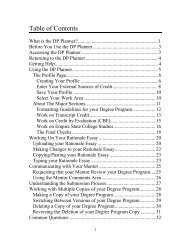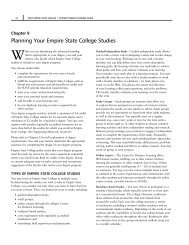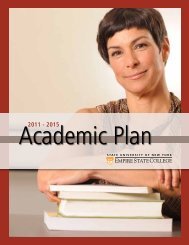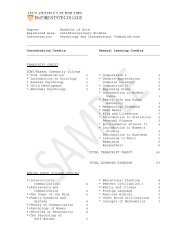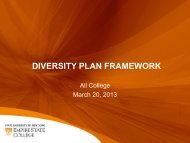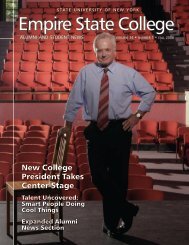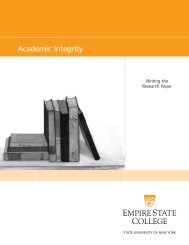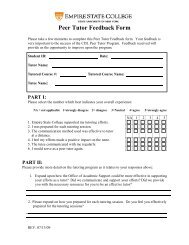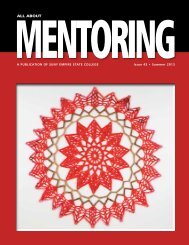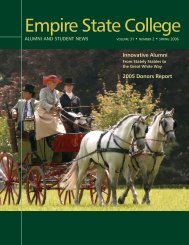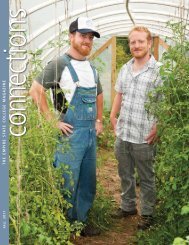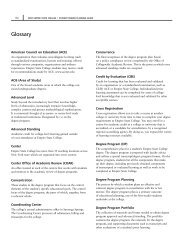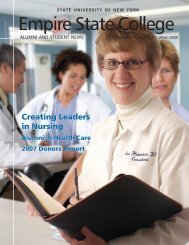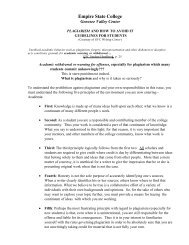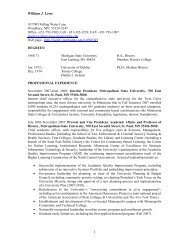All About Mentoring Spring 2011 - SUNY Empire State College
All About Mentoring Spring 2011 - SUNY Empire State College
All About Mentoring Spring 2011 - SUNY Empire State College
You also want an ePaper? Increase the reach of your titles
YUMPU automatically turns print PDFs into web optimized ePapers that Google loves.
2<br />
e d i t o r i a l<br />
The Expertise<br />
of Humility<br />
“Nobody sticks a finger in an electric fan<br />
to see what will happen. Conversely,<br />
we have all we can think about.”<br />
John Ashbery, “Zymurgy,”<br />
in Planisphere, 2009<br />
We depend on our expertise.<br />
Indeed, we calibrate the degree<br />
to which, in any given situation,<br />
our expertise is acknowledged, exercised,<br />
deepened. And we worry, with good reason,<br />
about the myriad ways in which what we<br />
think we do best is ignored, denigrated or<br />
just plain thinned out. Why learn all that<br />
we have learned if we’re not even given the<br />
space, the time, the encouragement to strut<br />
our stuff<br />
Yet, from the very start, <strong>Empire</strong> <strong>State</strong><br />
<strong>College</strong> has been confused about what<br />
legitimate strutting should be all about.<br />
What kind of strutting, if any, is appropriate<br />
for mentors to do We didn’t come to<br />
this place, did we, to become the kinds<br />
of experts we would be if we were on the<br />
faculty at a Research I institution, or even<br />
at a more conventional four-year liberal<br />
arts school But, at the same time, did we<br />
expect to be mired in what some feel to<br />
be the daily drudgeries of a new fangled<br />
version of Melville’s famous scrivener Yes,<br />
of course, we appreciated Boyer’s revision<br />
and expansion of what is “scholarly,” but,<br />
bottom line, even as so-called “mentors,”<br />
we just didn’t want to give it all up. We’re<br />
scholars – of some sort – damn it!<br />
We have learned that the qualities and<br />
expressions of meaningful mentorial<br />
expertise at our college (and at other<br />
colleges with core values similar to ours) are<br />
incredibly hard to articulate and, for sure,<br />
to regularly practice. And our difficulties<br />
are only made rougher by the slippery<br />
terrain of taken-for-granted assumptions<br />
about the glow of the professor-as-expert.<br />
It’s just not so easy to surrender, especially<br />
when confronted by the not so distant fear<br />
that such a scholarly construction is all<br />
that stands in the way of the loss of any<br />
kind of academic identity. When we’re<br />
frightened, we desperately grab onto a more<br />
conventional ideal.<br />
The question, however, shouldn’t go away:<br />
How, every day, sitting face to face with<br />
a student or being online, or working with<br />
a group, or taking a call – how, in any<br />
of these forms, can we – should we, as<br />
mentors – display what we know As an<br />
experimenting college, shouldn’t there be<br />
an experimenting expertise<br />
I’d say this: The professorial strut is<br />
tantalizing. Faculty pass along what they<br />
claim to know, develop curricula and<br />
whole programs based on their authority,<br />
produce research that assures their pedigree,<br />
and are rewarded for their single-minded<br />
commitment to their scholarly vocation.<br />
Professors are deemed authentic; they take<br />
pride in and expect recognition for their<br />
labors and fight for their time.<br />
And I’d also say this: The mentorial strut<br />
is harder to recognize let alone act on,<br />
exactly because the lure of the professorial<br />
is so strong. Can it ever be that responding<br />
to a student’s difficulty in organizing her<br />
thoughts, or confusion about what new<br />
studies he should take up, or worries about<br />
how her kids are responding to her many<br />
hours in front of the computer – that we<br />
truly believe that attention to these matters<br />
has real academic significance How about<br />
searching for an article with a student on a<br />
topic with which we’re not familiar because<br />
that student mentioned in passing that he<br />
had a question about it, or trying to just<br />
hang in there to find the learning we sense<br />
is lurking somewhere in a student’s work<br />
experience, or going back and forth, and<br />
then again, with a group of colleagues in an<br />
effort to revamp some procedural matter,<br />
or staring at a screen struggling to find just<br />
the right phrase to capture our judgment<br />
about the outcome of a student’s work<br />
Do we genuinely take these activities to<br />
be part of our scholarly lives Do we ever<br />
imagine in our heart-of-hearts that they are<br />
appropriately academic and carrying them<br />
out is an expression of our expertise<br />
Our challenge is not to draw ever-finer<br />
distinctions between teaching, service and<br />
scholarship because even within such an<br />
ingrained tripartite model, we know that<br />
there is already a tacit hierarchy. Our<br />
dilemma also cannot be reduced to one of<br />
workload, although without doubt, we have<br />
been bitten by this menace and its legacy<br />
of unfairness for years. I’d argue that the<br />
expertise of mentoring (in as much as we<br />
honor it at all) plays second fiddle because<br />
it is our own version of “care work,” a<br />
fantastic blend of the cognitive and the<br />
affective, a kind of experiential-emotionalintellectual<br />
labor that has been historically<br />
demeaned (so often as “women’s work”),<br />
but is personally enriching, socially valuable<br />
and intellectually complex.<br />
Yes, of course, deskilling continues to occur<br />
in many areas of labor (teaching at all<br />
levels included), but we shouldn’t confuse<br />
deskilling with the true skills necessary to<br />
carry out a complex and difficult faculty<br />
role and the deep learning demanded to<br />
do it well. We shouldn’t use our fantasy<br />
of the professorial strut as the criterion to<br />
judge an on-goingly experimental mentoring<br />
expertise that rests much more on our<br />
nuanced responses to not knowing, to our<br />
commitment to listening, and, overall, to a<br />
tradition of strong academic caring, than to<br />
the arrogance of claiming “I know it and<br />
you surely don’t.” Our distinctive mentoring<br />
strut is one that, in a most intricate turn,<br />
embeds our expertise in humility – a<br />
humility that we have to nurture together.<br />
Alan Mandell<br />
suny empire state college • all about mentoring • issue 39 • spring <strong>2011</strong>



